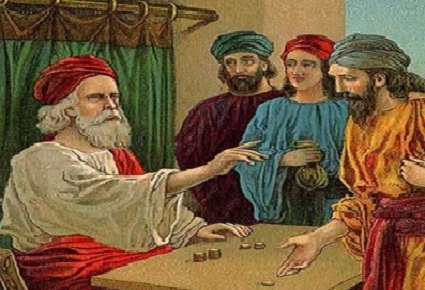This week we are reading through the parables of the Unrighteous Steward found in Luke 16:1-13 and the parable of the Rich Man and Lazarus found in Luke 16:19-31. These parables are found next to each other, with the parable of the Unrighteous Steward setting up the parable of the Rich Man and Lazarus. Before reading these parables, re-read the story of Jesus and the Rich Young Ruler (Luke 18:18-27) who provides the living example of the message of these two parables. Also, as you read through these parables, keep in mind that in first-century Palestine and for most of human history, the “poor” were those who lived from hand-to-mouth, and the “rich” were those who at least knew where their next meal was coming from.
The parable of the Unrighteous Steward is one of the more perplexing parables told by Jesus because it appears that Jesus is holding up a thief and a cheat as an example we should follow. Julian the Apostate, the last pagan Roman emperor who ruled from 361 to 363, and tried to reverse the political gains made by Christians under Constantine, held up this parable as an example of why Christianity was inferior to Greek philosophy. For Bailey, the parable continues the discussion of the Parable of the Prodigal Son which immediately precedes it (Luke 15:11-32), for the steward, like the son, places his very life in the hands of the person that he wronged. On the other hand, ++Dmitri reads the parable in light of its conclusion that we cannot serve both God and Wealth, and the parable teaches us the appropriate use of our wealth.
The second parable we are reading through this week is The Rich Man and Lazarus. Beginning with Marcion of Sinope in the mid-100’s, there are those in the Church who have tried to draw the false distinction between the destroying, jealous, condemning God of the Old Testament and the loving, embracing Jesus of the New Testament. However, as we see in the parable of the Rich Man and Lazarus, it is Jesus who speaks of condemnation more than anyone else in Scripture. But in most of his teachings, condemnation or salvation isn’t based upon a particular belief system nor on election, but rather on how we treat the least of society. For example, in the parable of the Sheep and the Goats concerning the last judgment (Matt. 25:31-46), the sheep are those who care for the hungry, the stranger, and the sick, and the goats who are sent away are the ones who did not. The only thing we know about the two characters is that one is dressed well and eats well and the other has dogs lick his sores. Just like the steward in the prior parable, the question is what do we do with what we have been given?
Dinner is at 6. Discussion around 6:45. The menu this week is lettuce wraps. Hope to see you here, and bring a friend.
Hallelujah!
Psalm 112
Happy are they who fear the Lord *
and have great delight in his commandments!
Their descendants will be mighty in the land; *
the generation of the upright will be blessed.
Wealth and riches will be in their house, *
and their righteousness will last for ever.
Light shines in the darkness for the upright; *
the righteous are merciful and full of compassion.
It is good for them to be generous in lending *
and to manage their affairs with justice.
For they will never be shaken; *
the righteous will be kept in everlasting remembrance.
They will not be afraid of any evil rumors; *
their heart is right; they put their trust in the Lord.
Their heart is established and will not shrink, *
until they see their desire upon their enemies.
They have given freely to the poor, *
and their righteousness stands fast for ever;
they will hold up their head with honor.
The wicked will see it and be angry;
they will gnash their teeth and pine away; *
the desires of the wicked will perish.


Pingback: The Gospel of Luke – Luke 16:1-17:10 – Faithfulness in Wealth – Ancient Anglican